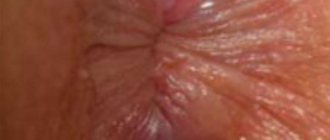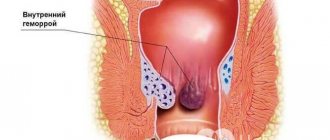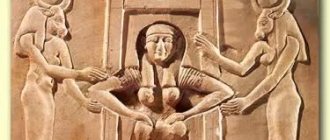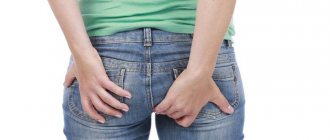Many expectant mothers are concerned about questions: is it possible to give birth with hemorrhoids, what kind of hemorrhoid prevention should be carried out before childbirth. During pregnancy, many women experience intense symptoms of the disease. There are certain reasons for this, directly related to pregnancy - a weakening of the immune system, dysfunction in the hormonal environment.
If you have chronic hemorrhoids, during this period it also worsens. Therefore, you need to know how to give birth with hemorrhoids, when hemorrhoids can become an obstacle to natural childbirth.
Why does the disease occur during pregnancy?
The reasons for the formation of hemorrhoids during pregnancy are varied, but experts identify the following:
- increased pressure from the growing uterus on the rectum. In this situation, blood stagnates in the pelvic area, and hemorrhoids form;
- frequent constipation. This problem is relevant for many pregnant women. In this case, the causes of constipation can be both poor nutrition and pressure of the uterus on the internal organs;
- decreased level of mobility. In late pregnancy, it becomes more difficult to move, causing blood to stagnate in the veins of the rectum.
In addition, progressive hemorrhoids in a pregnant woman may be the cause of a previously advanced disease. That is why, before planning a pregnancy, it is recommended to visit not only a gynecologist, but also a proctologist. Untreated hemorrhoids and childbirth will certainly lead to complications.
What are the risks of illness during childbirth?
Despite the fact that hemorrhoids during childbirth are not an indication for a cesarean section, nevertheless, an advanced form of the disease can lead to quite serious complications during childbirth. Most often, during labor, a woman may encounter the following problems:
- the development of heavy bleeding, which often cannot be stopped without medical intervention;
- pinching of hemorrhoids;
- tissue necrosis;
- development of the inflammatory process;
- severe pain;
- blood clot formation.
In addition, it is worth understanding that during childbirth, the disease can progress from the initial stage in a short time. Loss of nodes and their enlargement is the most common consequence of the disease.
The birth process during illness
As mentioned above, this disease is not a good reason to limit the natural birth process, but it is worth understanding that some cases require not just observation by a specialist, but also urgent surgical intervention. Depending on the degree of hemorrhoids, the obstetrician will decide whether the woman will give birth herself or perform a cesarean section. Naturally, making this decision is impossible without consulting a proctologist and carefully assessing the possible risks for the mother and child, since hemorrhoids and childbirth together can cause dangerous complications.
Natural childbirth
Let's take a closer look at whether you can give birth yourself with hemorrhoids. Despite the possible health risks, natural childbirth with hemorrhoids is a fairly common occurrence. In addition, the natural process has a lot of undeniable advantages over a cesarean section, which are as follows:
- natural childbirth with hemorrhoids is much easier for newborns to tolerate, as it has fewer complications. In addition, there is no need to use anesthesia, which carries certain risks for the mother and can affect the child;
- After natural childbirth, the recovery of the female body occurs several times faster than after surgery.
The main dangers during natural childbirth are:
- pinching of hemorrhoids. The fact is that during pushing, hemorrhoidal cones fall out and simply do not have time to get back into place, since immediately after the birth of the child, the anal valve “slams shut”, resulting in severe pain;
- transition of the disease to the acute stage.
In order to avoid these troubles during childbirth, you must strictly adhere to the recommendations of your obstetrician. In addition, hemorrhoids must be treated before childbirth!
Many problems associated with complications of hemorrhoids during childbirth can be avoided if you start treating the disease in advance and during pregnancy you are observed by a proctologist.
C-section
Caesarean section during hemorrhoids is extremely rarely prescribed. Typically, this decision is made against the background of serious complications that pose a direct threat to the health of the mother and child. The operation can be performed in the following cases:
- if a woman has a disease of 3-4 degrees, accompanied by prolapse of nodes that cannot be inserted into place;
- if a pregnant woman has been diagnosed with node thrombosis, which is accompanied by unbearable pain;
- if a pregnant woman has a high risk of bleeding or has developed severe anemia due to hemorrhoids;
- if the expectant mother develops an infection or purulent process of the rectum due to hemorrhoids. In this case, there is a risk of transfer of pathogenic microflora to the birth canal and, as a result, possible infection of the child.
Is caesarean section possible and in what cases?
Are hemorrhoids dangerous during childbirth? Only if the hemorrhoids are severely inflamed, heavy bleeding is present. In such a situation, natural childbirth is out of the question.
In such a case, the pain will be so severe that the woman may lose consciousness or even die from painful shock.
Additional contraindications to natural childbirth may include the following:
- Separation of the pubic bones.
- Large fruit.
- Tumors, fibroids in the uterine area.
- Unnatural location of the placenta.
- Transverse position of the baby in the womb.
- Malignant neoplasms.
Disease prevention
Many women do not know whether it is possible to give birth with hemorrhoids, but in order to ensure that the disease does not bother the expectant mother during pregnancy, the following tips must be strictly adhered to:
- It is important to establish a diet. This measure will help avoid constipation, which is the main cause of hemorrhoids;
- you need to move as much as possible. The ideal solution could be yoga for pregnant women or swimming. As a last resort, you can just walk in the park;
- You should carefully monitor the hygiene of the anal area. It is advisable to wash yourself with cool water after each bowel movement.
In addition to all of the above, it is necessary to visit a proctologist who can identify the disease at an early stage and give the necessary recommendations that will minimize the risk of disease progression.
Observation of a pregnant woman by a proctologist is no less important than observation by an obstetrician. You should not neglect the consultations and advice of a specialist, even if the problem does not cause any concern at all.
Pregnant women face various problems during the process of bearing a child. During this period, chronic diseases may worsen and new ailments may appear due to a decrease in immune defense, hormonal and physiological changes. Hemorrhoidal formations often appear during pregnancy. In addition to discomfort, a woman is worried about whether it is possible to give birth with hemorrhoids. The doctor can answer it only after examining the patient and making a diagnosis.
Preventive measures during childbirth
To prevent exacerbation of hemorrhoids, timely measures should be taken to treat it even at the stage of pregnancy planning. For these purposes, it is recommended to do the following.
- Follow the principles of proper nutrition to prevent chronic constipation.
- Maintain physical activity, visit the pool, gym, load your body with feasible sports activities.
- Avoid prolonged sitting.
- Adhere to the rules of personal hygiene.
- Systematically perform exercises to strengthen the muscles of the perineum and sphincter.
Hemorrhoids and childbirth are a very unpleasant and dangerous combination. As prescribed by a doctor, during pregnancy it is allowed to take phlebotropic medications that will strengthen the walls of veins and blood vessels, increase their muscle tone and elasticity, and this reduces the risk of ruptures during natural childbirth.
Why do hemorrhoids occur during pregnancy?
During pregnancy, a woman’s body reacts sharply to changes that occur. Therefore, there are factors that influence the formation and development of hemorrhoids.
- Due to the transformation of hormonal levels, vascular tone decreases due to relaxation of their muscles and walls. They are subject to stretching, which leads to the appearance of knots. As a result, the nodes fill with blood under the influence of congestion in the pelvis.
- With poor nutrition and weakened muscles, constipation may become more frequent. They lead to increased straining and enlargement of hemorrhoids.
- Due to the growth of the uterus, the blood vessels in the pelvis are compressed. This leads to increased symptoms of the disease.
Hemorrhoids before childbirth can confuse a woman; she begins to worry about the upcoming delivery. Whether a pregnant woman can give birth on her own can only be determined by a doctor after assessing the symptoms of the disease.
Is natural childbirth possible with hemorrhoids?
Classic childbirth with hemorrhoids is possible with an uncomplicated course of the disease. However, to choose a method of delivery, it is important to obtain confirmation from the doctor that the patient will not suffer complications.
In the initial stages of the disease, the doctor may
prescribe conservative therapy that will alleviate the woman’s condition and help eliminate the symptoms of the disease. Often in such cases, local preparations in the form of suppositories, gels or ointments are used. Effective remedies are suppositories with propolis and sea buckthorn. They eliminate itching, inflammation and discomfort in the anal area.
It is also recommended to perform light physical exercises that eliminate blood stagnation in the pelvic organs. The woman is shown swimming and walking.
Other preventive measures include:
- maintaining hygiene in the anus using a decoction of chamomile, nettle, and dandelion;
- compresses with grated beets, potatoes;
- lotions with warm burdock oil and aloe juice;
- diet to avoid constipation;
- use of enemas and Glycerin suppositories when constipation occurs (infrequently, so as not to become addictive).
Even if you have chronic hemorrhoids, your doctor will most likely allow a natural birth. This is due to the fact that this type of delivery is the safest for the baby. It will also be much easier for a woman to recover after a natural birth.
However, it is worth remembering that during childbirth, hemorrhoids can complicate the process by increasing the duration and increasing pain. In this case, it is important for the woman to follow all the recommendations given by the doctor and obstetrician.
During the birth of a child, an exacerbation of the disease may occur. In this case, hemorrhoids may fall out and become pinched. If the anal sphincter closes too quickly, the growths will not be able to return to the rectum on their own. The midwife can help the woman in labor by adjusting the nodes at the right time, which will prevent them from being pinched. As practice shows, such complications occur relatively rarely.
Useful video
Hemorrhoids are a common pathology that occurs as a result of a violation of the outflow of venous blood from hemorrhoids located in the mucous membrane of the rectum. The cause of node prolapse can be any of the following conditions: constipation, poor diet and increased pressure in the abdominal wall. It is the latter reason that becomes the basis for the development of hemorrhoids during childbirth. This is the main mechanism of the disease in the second half of the gestational period (after 20 weeks).
The tendency to constipation during pregnancy becomes a predisposing factor to stagnation of blood in the hemorrhoidal plexuses, but their prolapse may not occur directly. During natural childbirth, during pushing, the pressure in the abdominal cavity increases significantly, which is the main factor in the prolapse of varicose veins.
There are no subjective symptoms indicating that hemorrhoids came out during childbirth! The doctor who delivers the baby can tell you about plexus prolapse. The first clinical signs begin to appear after birth, after 4-6 hours. The main symptoms are:
- Sensation of a foreign body in the anus;
- The woman in labor herself can feel a dense formation in the anal area;
- Itching in the perineal area caused by sweating of inflammatory exudate;
- False urge to defecate;
- Bloody discharge from the anus. It is worth noting that after childbirth it is difficult for a woman to determine the source of bleeding on her own, because... over the next few days, blood is released from the vagina;
- Upon examination, round formations of various sizes of a dark blue color are found in the anal area (with external hemorrhoids, with internal hemorrhoids they are not visible);
- Painful sensations during rectal digital examination;
- During a rectal examination, the doctor palpates dense formations in the rectum (for internal hemorrhoids).
If hemorrhoids appeared before childbirth...
If no changes occurred in the rectal area during pregnancy, do not relax. Sometimes hemorrhoids appear immediately before childbirth, when pressure on the pelvic organs increases due to the weight of the child. However, panic is not the best assistant in this matter. In most cases, women give birth without consequences at the initial stage of hemorrhoids.
The birth process may be somewhat more complicated. The pain may become worse due to increased muscle tension. The movement of the child through the birth canal can cause compression of the blood vessels and the occurrence of severe stagnation. In this case, hemorrhoids may appear directly during childbirth.
If the course of labor is mild, injury and increased pain in the rectal area will not occur. If the process is delayed, the tension during pushing increases, which can lead to knots falling out. To avoid this, it is important to calm down and listen to your doctor. He will tell you how to push to avoid overstraining your muscles. In this case, treatment for hemorrhoids after childbirth will not be required.
Indications for natural delivery
Hemorrhoids become a contraindication to natural childbirth only if the course of the disease is aggravated by some factors. In such cases, a caesarean section is prescribed.
If in this condition the natural way of childbearing is not suitable, doctors advise refusing conception until the problem is solved by surgical intervention.
If experts allow a natural procedure, this does not mean that it will be completely painless.
How to give birth with hemorrhoids
It all depends on the professionalism of the obstetricians, who will provide moral and physical support. It is important for a mother in labor to be prepared for the fact that pain during the birth of the baby will increase significantly.
Indications for natural childbirth may include:
- normal course of the disease without prolapse of large nodes;
- absence of frequent bleeding and urge to go to the toilet;
- any non-aggravated form of development (except for the 4th stage);
- absence of possible complications that would complicate delivery.
At any moment, the mother can report unpleasant and painful sensations. In this case, surgical intervention by a surgeon will occur.
How to deal with hemorrhoids after childbirth?
Even women who do not experience hemorrhoid symptoms during pregnancy may experience problems after childbirth. The difficulty of treatment in this case lies in the impossibility of using many medications. They can pass into breast milk and affect the baby's condition.
At the same time, the disease cannot be started. If you have constipation, it will be much more difficult to cope with the consequences. Therefore, it is important for a woman to consult a doctor immediately. He will prescribe the necessary treatment. Typically, local drugs are prescribed during treatment:
Most of them are made on the basis of natural ingredients, and therefore do not affect the body of women and children. If there is no positive dynamics, the doctor will prescribe tablets for systemic action.
Hemorrhoids and pregnancy are interrelated. When the first signs of the disease appear, you can stop them in time. Then the woman will be able to give birth on her own without any problems.
Varicose veins of hemorrhoidal veins are, unfortunately, a frequent companion of expectant mothers. Moreover, an increase in cavernous formations in the anus can manifest itself before conception, during gestation and during labor.
Statistics show that 50% of pregnant women and women in labor face this unpleasant problem. It is not surprising that many expectant mothers are interested in whether it is possible to give birth with hemorrhoids.
Doctors reassure that most often a proctological disease is not a reason to cancel a natural birth, but in the case of certain severe conditions, surgical intervention may be prescribed.
A proctological disease is not a reason to cancel natural childbirth, but in the case of certain severe conditions, surgical intervention may be prescribed.
The danger of hemorrhoids during childbirth
Inflammation of hemorrhoidal nodules is not a strict indication for canceling the natural birth process. However, during resolution of the burden, as already mentioned, some negative consequences may still arise.
That is why experts advise women, even before conception, to minimize the risks of exacerbation of proctological disease - change their lifestyle, undergo surgery if necessary, and undergo a course of conservative therapy.
During the “pregnant” period, the disease can either worsen or occur for the first time. In such a situation, treatment is possible with the help of some approved medications or folk remedies. Moreover, it is better to fight hemorrhoids in the initial stages.
Causes of hemorrhoids in pregnant women and women in labor
Since varicose veins of hemorrhoidal veins can occur both before pregnancy and within 9 months, as well as during or after labor, there are several reasons for the formation of this pathological process.
Among the most common etiological factors, experts identify the following sources of the problem:
- improperly organized diet, which contributes to difficulties with bowel movements (preference for heavy foods, small amounts of fruits and vegetables);
- a sedentary lifestyle, characteristic of many residents of large cities, and a general lack of mobility;
- genetic predisposition, that is, an innate tendency to form enlarged corpora cavernosa;
- venous insufficiency, which often leads to both varicose veins of the lower extremities and hemorrhoids.
The high probability of developing varicose veins of the anal veins during pregnancy is associated with changes in hormonal balance and the natural physiology of a pregnant woman. Moreover, often the disease practically does not bother the expectant mother, worsening immediately before childbirth.
Factors that provoke inflammation of hemorrhoids in pregnant women are:
- weakening of the tone of smooth muscles and vascular walls, which is caused by an increased content of the hormone progesterone in the body (this is necessary to prevent miscarriage);
- chronic difficulties with bowel movements (associated, among other things, with low gastrointestinal tone), which are accompanied by straining and straining during bowel movements;
- stagnation of blood in the rectum and peritoneum, associated with pressing of the enlarged uterus onto nearby organs;
- low mobility, associated both with a completely objective reason (poor health and weakness), and with ordinary laziness and reluctance to actively move.
Hemorrhoids and childbirth, unfortunately, are quite often related. A woman in labor often discovers inflamed cavernous formations immediately upon delivery or after labor.
Childbirth occurring naturally puts a lot of strain on the pelvic organs. With involuntary contractions of the uterus, pushing and movement of the child along the birth canal, the pressure inside the peritoneum increases sharply, the muscles tense and compress the venous vessels located in the rectum.
As a result, the veins become overfilled with blood and hemorrhoidal nodules appear. In addition, contractions often result in injury to the rectal mucosa and the formation of cracks in the anus. Moreover, the severity of these phenomena largely depends on the duration and severity of labor.
Hemorrhoids and childbirth lead to an exacerbation of the chronic process, in some cases the disease moves to a more severe stage. However, after the birth of the child, the treatment of the pathology becomes somewhat simpler, since some effective medications and surgical interventions become permitted.
The high probability of developing varicose veins of the anal veins during pregnancy is associated with changes in hormonal balance and the natural physiology of a pregnant woman.









